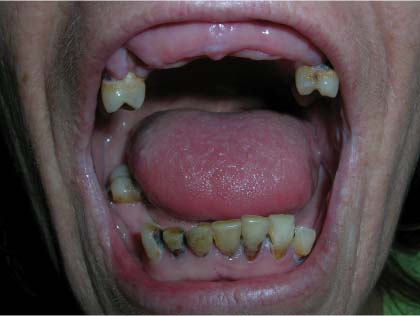The patient admitted to a 20-year history of methamphetamine use. The rampant dental caries and gingivitis commonly seen in methamphetamine users is known as “meth mouth.”
There are several causes of meth mouth:
- Vasoconstriction leads to decreased saliva production and dry mouth, which often result in consumption of large quantities of sugary beverages.
- Preoccupation with obtaining and using drugs often leads methamphetamine users to neglect their oral hygiene.
- Methamphetamine-induced bruxism also damages the teeth.
- Neglect of early symptoms and lack of access to (or failure to seek) dental care often lead to unsalvageable teeth that can only be extracted.
Referral for dental care is indicated for patients with gingivitis and dental caries caused by chronic methamphetamine use. On a daily basis, patients should brush their teeth with a soft-bristled toothbrush and use dental floss to treat and prevent oral pathology. Rinsing with a chlorhexidine-containing mouthwash may be a reasonable alternative for patients who find it too painful to floss. This patient, however, was lost to follow-up.
Photos and text for Photo Rounds Friday courtesy of Richard P. Usatine, MD. This case was adapted from: Rowe, M, Schechtman A. Methamphetamine. In: Usatine R, Smith M, Mayeaux EJ, et al, eds. The Color Atlas of Family Medicine. New York, NY: McGraw-Hill; 2009:994-999.
To learn more about The Color Atlas of Family Medicine, see:
• http://www.amazon.com/Color-Atlas-Family-Medicine/dp/0071474641
You can now get The Color Atlas of Family Medicine as an app for mobile devices including the iPhone, iPad, and all Android devices by clicking this link:


